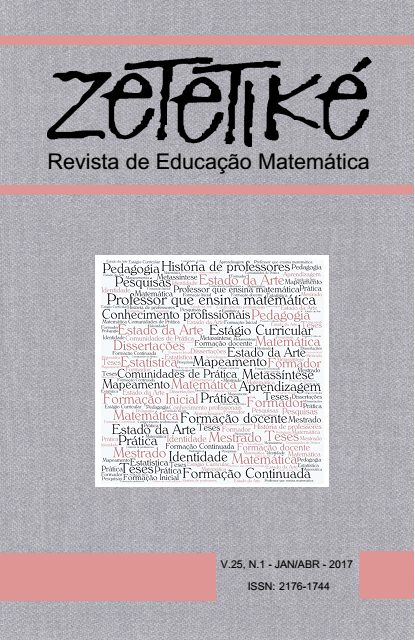Abstract
This paper discusses five master's dissertations identified from the areas of Teaching and Education, concluded
between 2008 and 2012, which deal with both the initial and the continuing education of teachers who teach
Mathematics in the initial years of schooling. Three of the dissertations discussed the collaboration between
university researchers and teachers of Basic Education. One of the studies discussed the articulation between
Pedagogy education and the teaching practice of Mathematics, and another study investigated the use of
technology in teacher education. It was found that a good way to articulate initial and continuing education are
processes that encourage cooperation between the different professionals from in and out of the school,
including university researchers and the teachers of the distinct levels of education within the school, so that
they all feel co-responsible for the mathematical development of the students.
References
André, M. (2009). A produção acadêmica sobre formação de professores: um estudo comparativo das dissertações e teses defendidas nos anos 1990 e 2000. Revista Brasileira de Pesquisa sobre Formação Docente, 1(1), 41-56. Disponível em: http://formacaodocente.autenticaeditora.com.br
Boavida, A.M. & Ponte, J.P. (2002). Investigação Colaborativa: Potencialidades e problemas. In GTI – Grupo de Trabalho sobre Investigação (Org), Reflectir e investigar sobre a prática profissional (pp.43-55). Lisboa: APM.
BRASIL (2001). Parecer CNE/CP nº 09, de 08 de maio de 2001: Institui as diretrizes curriculares nacionais para a formação de professores da educação básica, em nível superior, curso de licenciatura, de graduação plena. Brasília, DF. Disponível em: portal.mec.gov.br/cne/arquivos/pdf/009.pdf
Cavey, L. & Berenson, S. (2005). Learning to teach high school mathematics: Patterns of growth in understanding right triangle trigonometry during lesson plan study. Journal of Mathematical Behavior, 24(01), 171-190.
Charlot, B. (2000). Da relação com o saber: elementos para uma teoria. Porto Alegre: Artmed.
Cochran-Smith, M. & Lytle, S. L. (2009). Inquiry as stance: practitioner research for the next generation. New York: Teacher College Press.
Elia, I. & Mulligan, J. (2016, novembro 28). Abstract of TSG 1: Early childhood mathematics education (up to age7). Disponível em: http://www.icme13.org/topic_study_groups
Gatti, B. (2010). Formação de professores no Brasil: características e problemas. Educação e Sociedade, 31(113), 1355-1379.
Jaworski, B. (1993). The Professional Development of Teachers – the Potential of Critical Reflection. British Journal of In-Service Education, 19(32), 37-42.
Moreira, P. & David, M. (2007). A formação matemática do professor: licenciatura e prática docente escolar. Belo Horizonte: Ed. Autêntica.
Nacarato, A. (2005). A escola como locus de formação e de aprendizagem: possibilidades e riscos de colaboração. In D. Fiorentini e A. Nacarato (Orgs.). Cultura, formação e desenvolvimento profissional de professores que ensinam Matemática (pp. 175- 195). São Paulo: Musa Editora.
Nóvoa, A. (1991). Profissão Professor. Porto: Porto Editora.
OECD (1998). Staying Ahead: In-Service Training and Teacher Professional Development. Paris: OECD Publishing.
Pimenta, S. (Org.) (2012). Saberes Pedagógicos e Atividade Docente. (8a. ed.). São Paulo: Cortez Editora.
Roldão. M. C. (2007). A formação de professores como objecto de pesquisa - contributos para a construção do campo de estudo a partir de pesquisas portuguesas. Revista Eletrônica de Educação, 1 (1), 50-118. Disponível em http://www.reveduc.ufscar.br
Salles, S. (2005). Colaboração universidade-escola: contribuições para o desenvolvimento profissional de professores de Matemática. Dissertação (Mestrado) – Universidade Estadual Paulista. Disponível em: https://repositorio.unesp.br/bitstream/handle/11449/91005/salles_s_me_rcla.pdf?sequence=1&isAllowed=y
Serrazina, L. (1999). Reflexão, Conhecimento e Práticas Lectivas em Matemática num Contexto de Reforma Curricular no 1º Ciclo. Quadrante, 8(02), 139-167.
Serrazina, M. L. (2014). O Professor que Ensina Matemática e a sua Formação: uma experiência em Portugal. Educação & Realidade, 39(4), 1051-1069. Disponível em: http://www.seer.ufrgs.br/index.php/educacaoerealidade/article/view/45902/31459
Tardif, M. (2014). Saberes Docentes e Formação Profissional. (17a. ed.). Petrópolis, RJ: Vozes.
Zehetmeier, S., & Krainer, K. (2011). Ways of promoting the sustainability of mathematics teachers’ professional development. ZDM—The International Journal on Mathematics, 43(6/7), 875–887. Disponível em: http://link.springer.com/article/10.1007/s11858-011-0358-x
Zeichner, K.M. & Liston, D.P. (1987). Teaching student teachers to reflect. Harvard Educational Review, 57(1), 23-48.

This work is licensed under a Creative Commons Attribution-NonCommercial-NoDerivatives 4.0 International License.
Copyright (c) 2017 Zetetike

